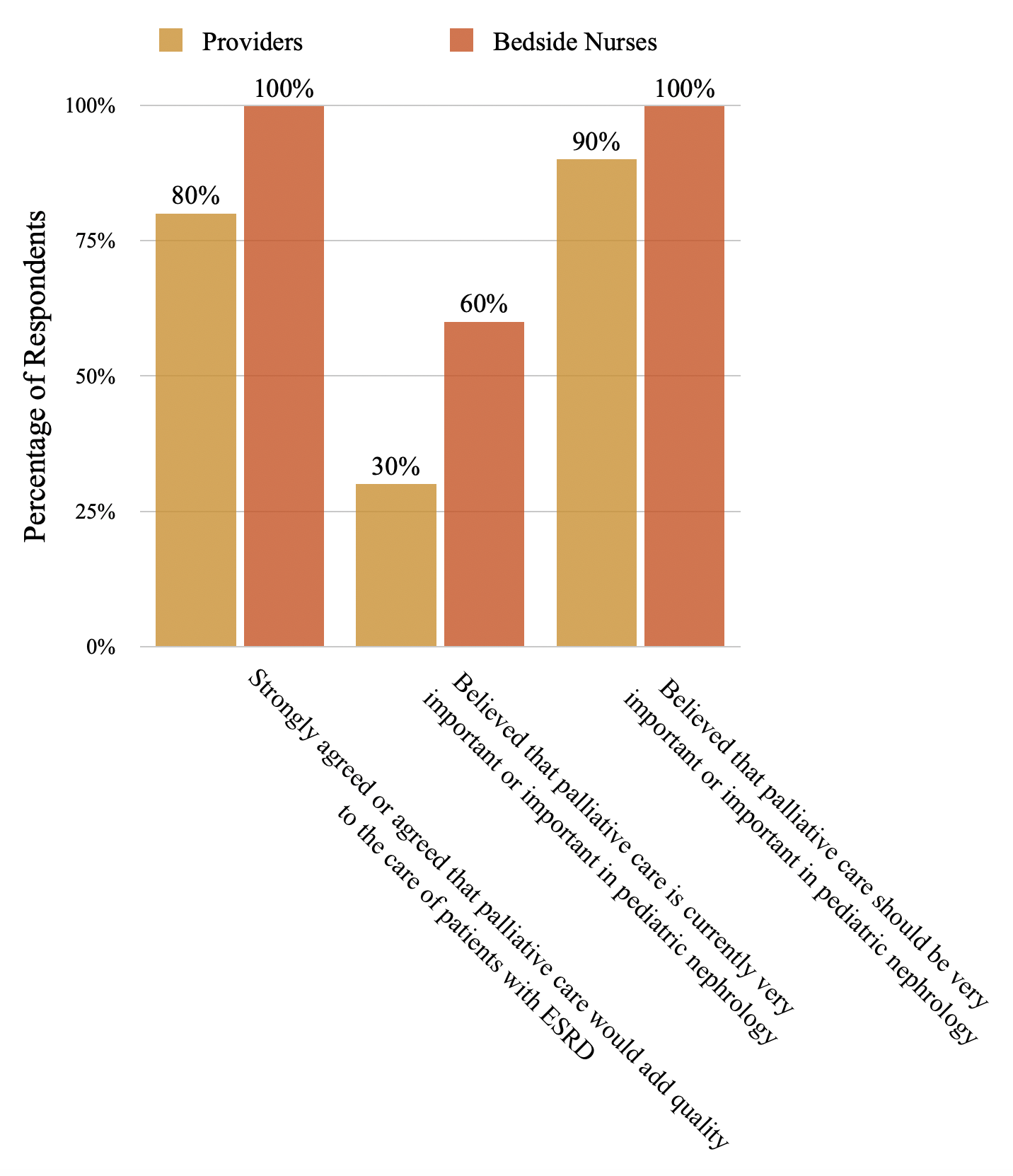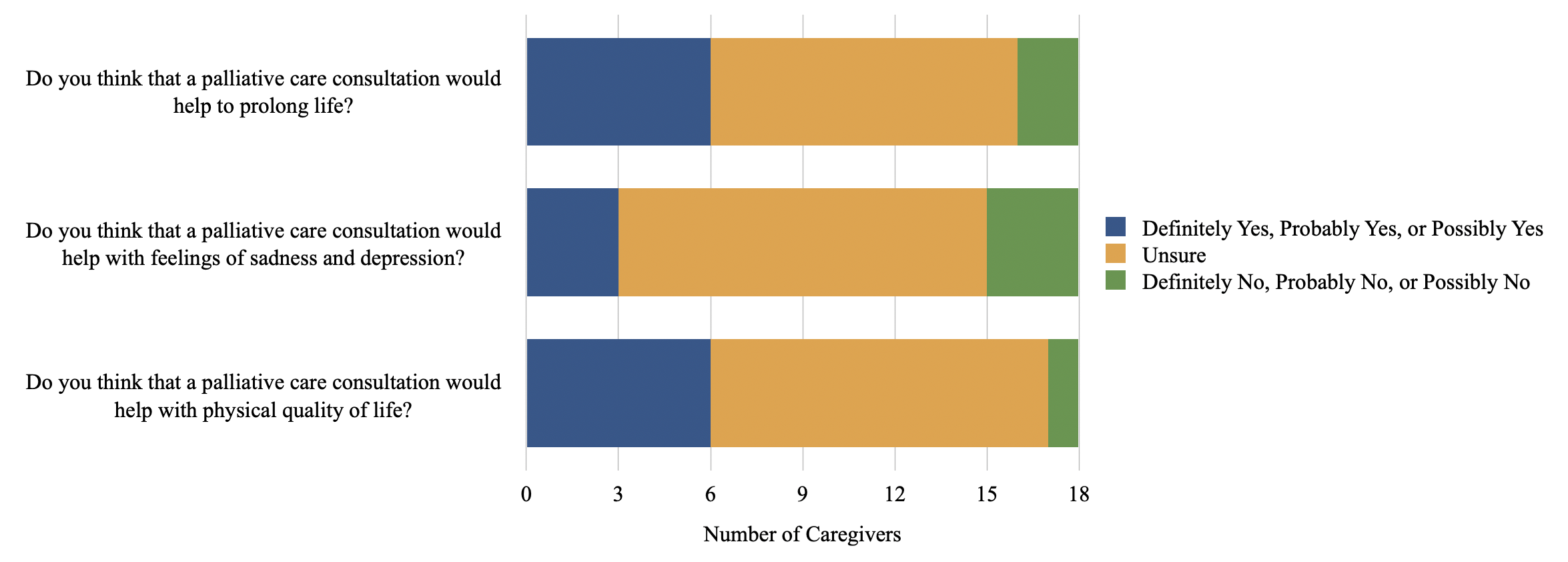Back
Background: Dialysis-dependent pediatric patients and their families face significant biopsychosocial burdens and low health-related quality of life. Palliative care consultations can alleviate suffering for patients and families but remain underutilized within pediatric nephrology.
Objective: We aimed to explore how providers, nurses, and caregivers perceive palliative care integration into the multidisciplinary care of dialysis-dependent pediatric patients.
Design/Methods: We surveyed pediatric nephrology providers (physicians and advanced practice providers), inpatient pediatric nephrology bedside nurses, and caregivers of dialysis-dependent pediatric patients at a freestanding tertiary care children’s hospital in Dallas, Texas. Participants completed a survey regarding knowledge about, experiences with, and perceptions of palliative care in pediatric nephrology.
Results: 10 providers, 20 nurses, and 18 caregivers completed the survey. Although 80% of providers and 100% of nurses agreed that palliative care would benefit dialysis-dependent pediatric patients, most believed that palliative care is not as important in pediatric nephrology as it should be. 70% of providers and 45% of nurses believed that they understand the scope of palliative care. 90% of providers and 100% of nurses desired more palliative care education. Of the 22% of caregivers whose child had already received palliative care services, 100% found the consultation to be helpful. Many providers and nurses worried that a palliative care consultation would signal to families that the nephrology team would be giving up on their child and that their child is approaching the end of life. However, no caregivers thought that a consultation would mean that the nephrology team would be giving up on their child and only 6% worried that it would indicate that their child is approaching the end of life.
Conclusion(s): These data support further palliative care education for pediatric nephrology providers and nurses and more robust and systematic integration of subspecialty palliative care services for dialysis-dependent pediatric patients.
Provider and Nurse Perspectives on the Importance of Palliative Care in Pediatric Nephrology
 Nearly all providers and nurses believed that palliative care would add quality to the care of pediatric patients with end-stage renal disease. Providers and nurses believed that palliative care should be more important in pediatric nephrology than it is currently.
Nearly all providers and nurses believed that palliative care would add quality to the care of pediatric patients with end-stage renal disease. Providers and nurses believed that palliative care should be more important in pediatric nephrology than it is currently.
Perceived Obstacles to Palliative Care Versus Caregiver Perspectives
.png) Providers and nurses cited two main concerns about palliative care consultations for dialysis-dependent pediatric patients: concern that it may signal to families that the medical team is giving up on their child and that it may signal that their child is approaching the end of life. However, no families worried that a palliative care consultation would mean that the nephrology team is giving up on their child and very few families thought that it would mean that their child would die sooner.
Providers and nurses cited two main concerns about palliative care consultations for dialysis-dependent pediatric patients: concern that it may signal to families that the medical team is giving up on their child and that it may signal that their child is approaching the end of life. However, no families worried that a palliative care consultation would mean that the nephrology team is giving up on their child and very few families thought that it would mean that their child would die sooner.
Caregiver Perceptions of the Potential Benefits of Palliative Care Consultations
 Most caregivers were uncertain about the potential benefits of a palliative care consultation. Some caregivers felt that a palliative care consultation would benefit their family, and very few caregivers held negative preconceptions about palliative care.
Most caregivers were uncertain about the potential benefits of a palliative care consultation. Some caregivers felt that a palliative care consultation would benefit their family, and very few caregivers held negative preconceptions about palliative care.
Provider and Nurse Perspectives on the Importance of Palliative Care in Pediatric Nephrology
 Nearly all providers and nurses believed that palliative care would add quality to the care of pediatric patients with end-stage renal disease. Providers and nurses believed that palliative care should be more important in pediatric nephrology than it is currently.
Nearly all providers and nurses believed that palliative care would add quality to the care of pediatric patients with end-stage renal disease. Providers and nurses believed that palliative care should be more important in pediatric nephrology than it is currently.
Perceived Obstacles to Palliative Care Versus Caregiver Perspectives
.png) Providers and nurses cited two main concerns about palliative care consultations for dialysis-dependent pediatric patients: concern that it may signal to families that the medical team is giving up on their child and that it may signal that their child is approaching the end of life. However, no families worried that a palliative care consultation would mean that the nephrology team is giving up on their child and very few families thought that it would mean that their child would die sooner.
Providers and nurses cited two main concerns about palliative care consultations for dialysis-dependent pediatric patients: concern that it may signal to families that the medical team is giving up on their child and that it may signal that their child is approaching the end of life. However, no families worried that a palliative care consultation would mean that the nephrology team is giving up on their child and very few families thought that it would mean that their child would die sooner.
Caregiver Perceptions of the Potential Benefits of Palliative Care Consultations
 Most caregivers were uncertain about the potential benefits of a palliative care consultation. Some caregivers felt that a palliative care consultation would benefit their family, and very few caregivers held negative preconceptions about palliative care.
Most caregivers were uncertain about the potential benefits of a palliative care consultation. Some caregivers felt that a palliative care consultation would benefit their family, and very few caregivers held negative preconceptions about palliative care.
Palliative Care
Session: Palliative Care
435 - Palliative Care for Dialysis-Dependent Pediatric Patients: A Survey of Providers, Nurses, and Caregivers
Sunday, April 27, 2025
8:30am – 10:45am HST
Joshua Lipsitz, Texas Children’s Hospital, Houston, TX, United States; Katherine Maddox, University of Texas Southwestern Medical School, Dallas, TX, United States; Stockton Beveridge, University of Texas Southwestern Medical School, Nashville, TN, United States

Joshua Lipsitz, MD
Pediatric Hospice and Palliative Medicine Fellow
Texas Children’s Hospital
Houston, Texas, United States
Presenting Author(s)
Background: Dialysis-dependent pediatric patients and their families face significant biopsychosocial burdens and low health-related quality of life. Palliative care consultations can alleviate suffering for patients and families but remain underutilized within pediatric nephrology.
Objective: We aimed to explore how providers, nurses, and caregivers perceive palliative care integration into the multidisciplinary care of dialysis-dependent pediatric patients.
Design/Methods: We surveyed pediatric nephrology providers (physicians and advanced practice providers), inpatient pediatric nephrology bedside nurses, and caregivers of dialysis-dependent pediatric patients at a freestanding tertiary care children’s hospital in Dallas, Texas. Participants completed a survey regarding knowledge about, experiences with, and perceptions of palliative care in pediatric nephrology.
Results: 10 providers, 20 nurses, and 18 caregivers completed the survey. Although 80% of providers and 100% of nurses agreed that palliative care would benefit dialysis-dependent pediatric patients, most believed that palliative care is not as important in pediatric nephrology as it should be. 70% of providers and 45% of nurses believed that they understand the scope of palliative care. 90% of providers and 100% of nurses desired more palliative care education. Of the 22% of caregivers whose child had already received palliative care services, 100% found the consultation to be helpful. Many providers and nurses worried that a palliative care consultation would signal to families that the nephrology team would be giving up on their child and that their child is approaching the end of life. However, no caregivers thought that a consultation would mean that the nephrology team would be giving up on their child and only 6% worried that it would indicate that their child is approaching the end of life.
Conclusion(s): These data support further palliative care education for pediatric nephrology providers and nurses and more robust and systematic integration of subspecialty palliative care services for dialysis-dependent pediatric patients.
Provider and Nurse Perspectives on the Importance of Palliative Care in Pediatric Nephrology
 Nearly all providers and nurses believed that palliative care would add quality to the care of pediatric patients with end-stage renal disease. Providers and nurses believed that palliative care should be more important in pediatric nephrology than it is currently.
Nearly all providers and nurses believed that palliative care would add quality to the care of pediatric patients with end-stage renal disease. Providers and nurses believed that palliative care should be more important in pediatric nephrology than it is currently.Perceived Obstacles to Palliative Care Versus Caregiver Perspectives
.png) Providers and nurses cited two main concerns about palliative care consultations for dialysis-dependent pediatric patients: concern that it may signal to families that the medical team is giving up on their child and that it may signal that their child is approaching the end of life. However, no families worried that a palliative care consultation would mean that the nephrology team is giving up on their child and very few families thought that it would mean that their child would die sooner.
Providers and nurses cited two main concerns about palliative care consultations for dialysis-dependent pediatric patients: concern that it may signal to families that the medical team is giving up on their child and that it may signal that their child is approaching the end of life. However, no families worried that a palliative care consultation would mean that the nephrology team is giving up on their child and very few families thought that it would mean that their child would die sooner.Caregiver Perceptions of the Potential Benefits of Palliative Care Consultations
 Most caregivers were uncertain about the potential benefits of a palliative care consultation. Some caregivers felt that a palliative care consultation would benefit their family, and very few caregivers held negative preconceptions about palliative care.
Most caregivers were uncertain about the potential benefits of a palliative care consultation. Some caregivers felt that a palliative care consultation would benefit their family, and very few caregivers held negative preconceptions about palliative care.Provider and Nurse Perspectives on the Importance of Palliative Care in Pediatric Nephrology
 Nearly all providers and nurses believed that palliative care would add quality to the care of pediatric patients with end-stage renal disease. Providers and nurses believed that palliative care should be more important in pediatric nephrology than it is currently.
Nearly all providers and nurses believed that palliative care would add quality to the care of pediatric patients with end-stage renal disease. Providers and nurses believed that palliative care should be more important in pediatric nephrology than it is currently.Perceived Obstacles to Palliative Care Versus Caregiver Perspectives
.png) Providers and nurses cited two main concerns about palliative care consultations for dialysis-dependent pediatric patients: concern that it may signal to families that the medical team is giving up on their child and that it may signal that their child is approaching the end of life. However, no families worried that a palliative care consultation would mean that the nephrology team is giving up on their child and very few families thought that it would mean that their child would die sooner.
Providers and nurses cited two main concerns about palliative care consultations for dialysis-dependent pediatric patients: concern that it may signal to families that the medical team is giving up on their child and that it may signal that their child is approaching the end of life. However, no families worried that a palliative care consultation would mean that the nephrology team is giving up on their child and very few families thought that it would mean that their child would die sooner.Caregiver Perceptions of the Potential Benefits of Palliative Care Consultations
 Most caregivers were uncertain about the potential benefits of a palliative care consultation. Some caregivers felt that a palliative care consultation would benefit their family, and very few caregivers held negative preconceptions about palliative care.
Most caregivers were uncertain about the potential benefits of a palliative care consultation. Some caregivers felt that a palliative care consultation would benefit their family, and very few caregivers held negative preconceptions about palliative care.
